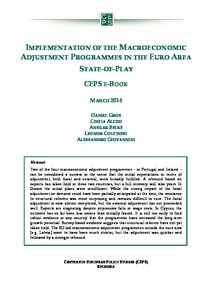Implementation of the macroeconomic adjustment programmes in the Euro area: state-of-play
"Two of the four macroeconomic adjustment programmes – in Portugal and Ireland – can be considered a success in the sense that the initial expectations in terms of adjustment, both fiscal and external, were broadly fulfilled. A rebound based on exports has taken hold in these two countries, but...
| Main Authors: | , , , , |
|---|---|
| Institution: | ETUI-European Trade Union Institute |
| Format: | TEXT |
| Language: | English |
| Published: |
Brussels
2014
CEPS |
| Subjects: | |
| Online Access: | https://www.labourline.org/KENTIKA-19110535124919387179-implementation-of-the-macroeco.htm |
| Summary: | "Two of the four macroeconomic adjustment programmes – in Portugal and Ireland – can be considered a success in the sense that the initial expectations in terms of adjustment, both fiscal and external, were broadly fulfilled. A rebound based on exports has taken hold in these two countries, but a full recovery will take years. In Greece the initial plans were insufficient. While the strong impact of the fiscal adjustment on demand could have been partially anticipated at the time, the resistance to structural reforms was more surprising and remains difficult to cure. The fiscal adjustment is now almost completed, but the external adjustment has not proceeded well. Exports are stagnating despite impressive falls in wage costs. In Cyprus, the outcome has so far been less severe than initially feared. It is still too early to find robust evidence in any country that the programmes have increased the long-term growth potential. Survey-based evidence suggests that structural reforms have not yet taken hold. The EU-led macroeconomic adjustment programmes outside the euro area (e.g. Latvia) seem to have been much stricter, but the adjustment was quicker and followed by a stronger rebound." |
|---|---|
| Physical Description: | 71 p. Digital |

